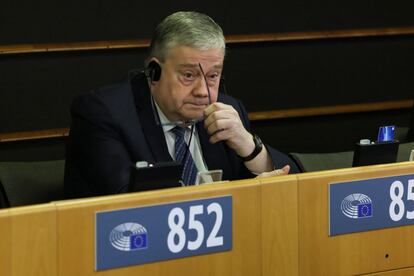Two members of European Parliament are stripped of immunity over ‘Qatargate’
Marc Tarabella of Belgium and Andrea Cozzolino of Italy are suspected of involvement in a cash-for-favors scandal that has shaken EU institutions

The European Parliament on Thursday revoked the immunity of two of its members, Marc Tarabella and Andrea Cozzolino – both of the center-left Socialists and Democrats group – whom Belgian justice authorities wants to question for their alleged involvement in Qatargate, a scandal involving bribes paid to EU lawmakers to influence decisions affecting Qatar and Morocco.
In a show of hands, the assembly quickly and overwhelmingly voted to lift the immunity of both MEPs, who are defending their innocence and have declared themselves in favor of being investigated to prove it. In fact, Tarabella showed up on Thursday and also voted to have his own immunity lifted.
The procedure to waive immunity at the request of a national court has been especially fast, a sign of the European Parliament’s willingness to show that it is acting in the face of a scandal that has seriously affected its reputation. Just a month ago, at the request of the Belgian justice system, the president of the European Parliament, Roberta Metsola, formally requested to fast-track the process and set a February 13 deadline.
Metsola will now officially inform the Belgian authorities, according to parliamentary sources. At that point, the Belgian justice system will be able to question and, if considered necessary, arrest Tarabella and Cozzolino.
According to the report prepared to allow Tarabella’s immunity to be lifted, a Belgian investigation shows that he “may have been involved in acts of corruption connected with interference by one or more foreign states aimed at influencing the debates and decisions taken in the European Parliament.” It said that “testimony against him suggests that such payments were made to him on several occasions, amounting to a total of between” €120,000 and €140,000 ($132,000 and $154,000).
Both have repeatedly denied their involvement in the scandal, in which Qatari and Moroccan officials are suspected of offering bribes to influence decisions at the European Parliament. Qatar and Morocco have also vehemently denied involvement, but the assembly has suspended work on all Qatar-related files. Tarabella has declared that he is willing to answer the accusations that other individuals involved in the case have launched against him, especially the former MEP Pier Antonio Panzeri.
Prosecutors said last month that Panzeri and his lawyers have signed a memorandum in which he repents for his acts. In the memorandum, he pledged to tell investigators how the scheme worked, what financial arrangements were made with other countries, how the money was moved around, who was behind the plan and what they stood to gain, and to name others who might be involved. According to leaks to the media, Panzeri stated that he paid Tarabella more than €120,000 in cash.
The police searched Tarabella’s home on December 10, one day after the raid that triggered the case and which led to the arrest of Panzeri, Eva Kaili (the former vice president of the European Parliament), the latter’s partner and parliamentary assistant Francesco Giorgi, and Niccola Figa-Talamanca, former head of a non-profit group allegedly involved in the bribery scheme. All four are still in pre-trial detention, accused of corruption, money laundering and membership in a criminal organization.
Sign up for our weekly newsletter to get more English-language news coverage from EL PAÍS USA Edition
Tu suscripción se está usando en otro dispositivo
¿Quieres añadir otro usuario a tu suscripción?
Si continúas leyendo en este dispositivo, no se podrá leer en el otro.
FlechaTu suscripción se está usando en otro dispositivo y solo puedes acceder a EL PAÍS desde un dispositivo a la vez.
Si quieres compartir tu cuenta, cambia tu suscripción a la modalidad Premium, así podrás añadir otro usuario. Cada uno accederá con su propia cuenta de email, lo que os permitirá personalizar vuestra experiencia en EL PAÍS.
¿Tienes una suscripción de empresa? Accede aquí para contratar más cuentas.
En el caso de no saber quién está usando tu cuenta, te recomendamos cambiar tu contraseña aquí.
Si decides continuar compartiendo tu cuenta, este mensaje se mostrará en tu dispositivo y en el de la otra persona que está usando tu cuenta de forma indefinida, afectando a tu experiencia de lectura. Puedes consultar aquí los términos y condiciones de la suscripción digital.








































